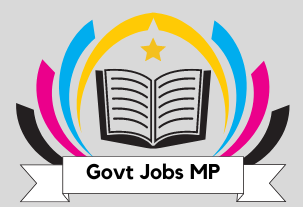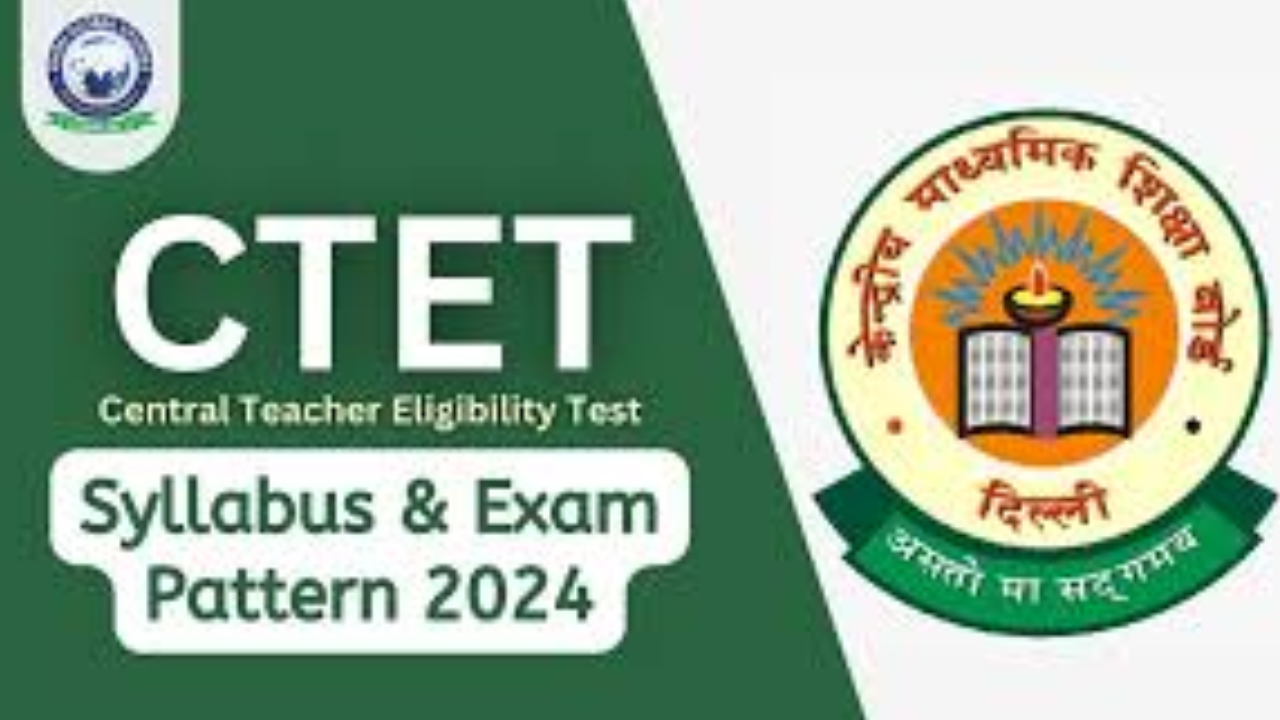CTET Syllabus 2024: The Central Board of Secondary Education (CBSE) is responsible for conducting the CTET Exam 2024. The CTET is organized twice a year to offer the eligibility of the applicants for teaching positions in government schools. Now this year, the CBSE will conduct the CTET on 7th July 2024. So, the CTET Exam Syllabus and Exam Pattern have been released for examination preparation. To know about CTET Paper 1 and Paper 2, applicants read this article carefully.
The CTET Exam 2024 will be conducted in two papers, Paper 1 and Paper 2. Paper 1 is for all those candidates who wish to become teachers for Classes 1 to 5 and Paper 2 is to become teachers for Class 6 to 8. Now, all candidates will need to check CTET Syllabus 2024 completely along with the exam pattern to crack the examination refer to the further benefits.
CTET Syllabus 2024
| Exam Conducting Authority |
Central Board of Secondary Education (CBSE) |
| Exam Name |
Central Teacher Eligibility Test (CTET July 2024) |
| CTET Exam Date 2024 |
7th July 2024 |
| CTET Exam Mode |
Offline |
| Category |
Syllabus |
| Official Website |
ctet.nic.in |
CTET Exam Pattern 2024 Paper 1
| Subjects |
Chapter |
Total Questions |
Total Marks |
| Child Development & Pedagogy |
Development of a Primary School Child |
15 |
30 |
| Concept of Inclusive education and understanding children with special needs |
5 |
| Learning and Pedagogy |
10 |
| Language 1
Language 2 |
Language Comprehension |
15 |
30 |
| Pedagogy of Language Development |
15 |
| Mathematics |
Content (numbers, solving simple equations, algebra, geometry patterns, time, measurement, data handling, solids, data handling, etc.) |
15 |
30 |
| Pedagogical issues |
15 |
| Environmental Studies |
Content (environment, food, shelter, water, family, and friends, etc.) |
15 |
30 |
| Pedagogical Issues |
15 |
CTET Syllabus 2024 Paper 2
| Subjects |
Syllabus |
| Child Development and Pedagogy |
- Concept of development and its relationship with learning
- Principles of the development of children
- Influence of Heredity & Environment
- Socialisation processes: Social world & children (Teacher, Parents, Peers)
- Piaget, Kohlberg and Vygotsky: constructs and critical perspectives
- Concepts of child-centred and progressive education
- Critical perspective of the construct of Intelligence
- Multi-Dimensional Intelligence
- Language & Thought
- Gender as a social construct; gender roles, gender bias and educational practice
- Individual differences among learners, understanding differences based on diversity of language, caste, gender, community, religion etc.
- The distinction between Assessment for learning and assessment of learning: School-Based Assessment, Continuous and comprehensive Evaluation: perspective and practice
- Formulating appropriate questions for assessing readiness levels of learners for enhancing learning and critical thinking in the classroom and for assessing learner achievement.
|
- Concept of Inclusive education and understanding children with special needs
- Addressing learners from diverse backgrounds, including disadvantaged and deprived
- Addressing the needs of children with learning difficulties, ‘impairment’, etc.
- Addressing the Talented, Creative, Specially abled Learners
|
Learning and Pedagogy
- How children think and learn; how and why children ‘fail’ to achieve success in school performance.
- Basic processes of teaching and learning; children’s strategies of learning; learning as a social activity; social context of learning.
- Child as a problem solver and a ‘scientific investigator’
- Alternative conceptions of learning in children, understanding children’s ‘errors’ as significant steps in the learning process.
- Cognition & Emotions
- Motivation and learning
- Factors contributing to learning – personal & environmental
|
| Language I |
Language Comprehension
Reading unseen passages – two passages, one prose or drama and one poem with questions on comprehension, inference, grammar and verbal ability (Prose passage may be literary, scientific, narrative or discursive)
|
- Pedagogy of Language Development
- Learning and acquisition
- Principles of Language Teaching
- Role of listening and speaking; function of language and how children use it as a tool
- A critical perspective on the role of grammar in learning a language for communicating ideas verbally and in written form
- Challenges of teaching language in a diverse classroom; language difficulties, errors and disorders
- Language Skills
- Evaluating language comprehension and proficiency: speaking, listening, reading and writing
- Teaching-learning materials: Textbook, multimedia materials, multilingual resources of the classroom
- Remedial Teaching
|
| Language II |
Comprehension
- Two unseen prose passages (discursive or literary narrative or scientific) with questions on comprehension, grammar and verbal ability.
|
Pedagogy of Language Development
- Learning and acquisition
- Principles of Language Teaching
- Role of listening and speaking; function of language and how children use it as a tool
- A critical perspective on the role of grammar in learning a language for communicating ideas verbally and in written form;
- Challenges of teaching language in a diverse classroom; language difficulties, errors, and disorders
- Language Skills
- Evaluating language comprehension and proficiency: speaking, listening, reading, and writing
- Teaching-learning materials: Textbook, multimedia materials, multilingual resources of the classroom
- Remedial Teaching
|
| Mathematics |
Content
- Geometry
- Shapes & Spatial Understanding
- Solids around Us
- Numbers
- Addition and Subtraction
- Multiplication
- Division
- Measurement
- Weight
- Time
- Volume
- Data Handling
- Patterns
- Money
|
Pedagogical issues
- Nature of Mathematics/Logical thinking: understanding children’s thinking and reasoning patterns and strategies of making meaning and learning
- Place of Mathematics in Curriculum
- Language of Mathematics
- Community Mathematics
- Valuation through formal and informal methods
- Problems of Teaching
- Error analysis and related aspects of learning and teaching
- Diagnostic and Remedial Teaching
|
| Environmental Studies |
Content
- Family and Friends: Relationships, Work and Play, Animals and Plants
- Food
- Shelter
- Water
- Travel
- Things We Make and Do
|
- Pedagogical Issues
- Concept and scope of EVS
- Significance of EVS, integrated EVS
- Environmental Studies & Environmental Education
- Learning Principles
- Scope & relation to Science & Social Science
- Approaches of presenting concepts
- Activities
- Experimentation/Practical Work
- Discussion
- CCE
- Teaching material/Aids
- Problems
|
CTET Exam Pattern for Paper 2
| Subjects |
Chapters |
Total Questions |
Total Marks |
| Child Development and Pedagogy |
Development of an Elementary School Child |
15 |
30 |
| Concept of Inclusive education and understanding children with special needs |
5 |
| Learning and Pedagogy |
10 |
| Language 1 |
Language Comprehension |
15 |
30 |
| Pedagogy of Language Development |
15 |
| Language 2 |
Language Comprehension |
15 |
30 |
| Pedagogy of Language Development |
15 |
| Mathematics & Science |
Mathematics Number system, Algebra, Geometry, Mensuration, Data Handling Pedagogical issues |
20 |
60 |
| Pedagogical issues |
10 |
| Science Food, Materials, the world of the living, Moving things, people and ideas, How things work, Natural phenomena, and resources |
20 |
| Pedagogical issues |
10 |
| Social Studies |
History, Geography, Social and Political Life |
40 |
60 |
| Pedagogical issues |
20 |
CTET Syllabus for Paper 2
| Subjects |
Syllabus |
| Child Development and Pedagogy |
Child Development (Elementary School Child
- Concept of development and its relationship with learning
- Principles of the development of children
- Influence of Heredity & Environment
- Socialisation processes: Social world & children (Teacher, Parents, Peers)
- Piaget, Kohlberg and Vygotsky: constructs and critical perspectives
- Concepts of child-centred and progressive education
- Critical perspective of the construct of Intelligence
- Multi-Dimensional Intelligence
- Language & Thought
- Gender as a social construct; gender roles, gender bias and educational practice
- Individual differences among learners, understanding differences based on diversity of language, caste, gender, community, religion, etc.
- The distinction between Assessment for learning and assessment of learning: School-Based Assessment, Continuous and Comprehensive Evaluation: perspective and practice
- Formulating appropriate questions for assessing readiness levels of learners for enhancing learning and critical thinking in the classroom and for assessing learner achievement.
|
- Concept of Inclusive education and understanding children with special needs.
- Addressing learners from diverse backgrounds, including disadvantaged and deprived.
- We are addressing the needs of children with learning difficulties.
- Addressing the Talented, Creative, Specially abled Learners.
|
Learning and Pedagogy
- How children think and learn; how and why children ‘fail’ to achieve success in school performance.
- Basic teaching and learning processes; children’s learning strategies; learning as a social activity; social context of learning.
- Child as a problem solver and a ‘scientific investigator’
- Alternative conceptions of learning in children, understanding children’s ‘errors’ as significant steps in the learning process.
- Cognition & Emotions
- Motivation and learning
- Factors contributing to learning – personal & environmental
|
| Language I |
Language Comprehension
- Reading unseen passages – two passages, one prose or drama and one poem with questions on comprehension, inference, grammar and verbal ability.
|
Pedagogy of Language Development
- Learning and acquisition
- Principles of Language Teaching
- Role of listening and speaking; function of language and how children use it as a tool
- A critical perspective on the role of grammar in learning a language for communicating ideas verbally and in written form; Challenges of teaching language in a diverse classroom; language difficulties, errors and disorders
- Language Skills
- Evaluating language comprehension and proficiency: speaking, listening, reading and writing
- Teaching-learning materials: Textbook, multimedia materials, multilingual resources of the classroom
- Remedial Teaching
|
| Language II |
Comprehension
- Two unseen prose passages (discursive or literary narrative or scientific) with questions on comprehension, grammar, and verbal ability
|
Pedagogy of Language Development
- Learning and acquisition
- Principles of Language Teaching
- Role of listening and speaking; function of language and how children use it as a tool
- A critical perspective on the role of grammar in learning a language for communicating ideas verbally and in written form; Challenges of teaching language in a diverse classroom; language difficulties, errors and disorders
- Language Skills
- Evaluating language comprehension and proficiency: speaking, listening, reading and writing
- Teaching-learning materials: Textbook, multimedia materials, multilingual resources of the classroom
- Remedial Teaching
|
| Mathematics |
Content
- Number System
- Knowing our Numbers
- Playing with Numbers
- Whole Numbers
- Negative Numbers and Integers
- Fractions
- Algebra
- Introduction to Algebra
- Ratio and Proportion
- Geometry
- Basic geometrical ideas (2-D)
- Understanding Elementary Shapes (2-D and 3-D)
- Symmetry: (reflection)
- Construction (using Straight edge Scale, protractor, compasses)
- Mensuration
- Data handling
|
Pedagogical issues
- Nature of Mathematics/Logical Thinking
- Place of Mathematics in Curriculum
- Language of Mathematics
- Community Mathematics
- Evaluation
- Remedial Teaching
- Problem of Teaching
|
| Science |
Content
- Food
- Materials
- The World of the Living
- Moving Things People and Ideas
- How things work
- Natural Phenomena
- Natural Resources
|
Pedagogical issues
- Nature & Structure of Sciences
- Natural Science/Aims & objectives
- Understanding & Appreciating Science
- Approaches/Integrated Approach
- Observation/Experiment/Discovery (Method of Science)
- Innovation
- Text Material/Aids
- Evaluation – cognitive/psychomotor/affective
- Problems
- Remedial Teaching
|
| Social Studies/Social Sciences |
History
- Geography
- Social and Political Life
- Pedagogical issues
|

